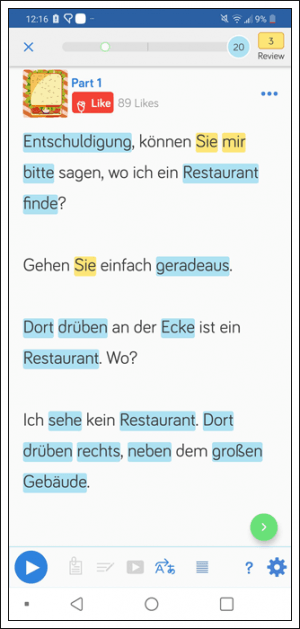How Long Does it Take to Learn German
Who doesn’t lead a busy life these days?
If you’re thinking about taking up a new language, the number-one question on your mind is probably something like “Yeah, learning is fun and all, but how long until I’m fluent?”
Unfortunately the answer to that one, every single time, is “it depends.” If you study every day, you’ll make way more progress than someone who just studies when it’s convenient.
Furthermore, each and every language has things that are going to be easy to learn and things that are going to be more of a struggle.
In the case of German, you’ll be glad to know that (for English speakers at least) most aspects fall into the earlier camp.
Let’s get right down to it and find the answer to the question, How long does it take to learn German?
What makes German easy
Vocabulary
Congratulations! As a native English speaker, you already know a lot of German. Some 1000-2000 words, by my guess.
Vocabulary is something that has its challenges in every language, but in German, educated English speakers have a distinct advantage.
Aside from hundreds of easy ones that are practically identical in both languages, it turns out that a lot of words in English are cognate with everyday German words. Once you learn a couple of regular sound and spelling changes, plenty of words become transparent – or at least easier to remember.
For example, the words die Pflanze and das Pfund aren’t far away from plant or pound, and once you hear them they’re likely to stick in your mind permanently.
Verb Tenses
German verb tenses are very similar to English for the most part. Wherever you need a helping verb in English, you probably need one in German too.
So when you want to say something like this:
I will see him.
Ich werde ihn sehen.
… it ends up lining up very well syntactically.
Although there are some more challenging parts of German grammar, you shouldn’t need to spend more than a handful of lessons on the verbs themselves.
What makes German hard
Fixed Expressions
The words “phrasal verbs” are the horror of many English learners. Sad to say, there are just as many in German.
You “have a right to freedom” in English, but in German you haben ein Recht auf Freiheit – literally a right on freedom. Or you “get the impression” in English, and “win the impression” (den Eindruck gewinnen) in German.
Perhaps the most common mistake is directly translating “interested in” into German, where it should be sich interessieren für, or “interest oneself for.”
There’s no trick for these. They just have to be memorized or picked up over time.
Prefixed verbs
In the same way, adding a prefix to a verb changes its meaning too – and this isn’t always predictable either.
Führen means “to lead” and verführen means “to mislead” but that doesn’t mean you can go around putting ver– in front of your verbs to give them negative connotations. Verantworten means “to be responsible for” and verkleiden means “to disguise,” for instance.
These, too, have to be memorized over time.
So, how long does it take to learn German
Let’s assume you have a moderate commitment of an hour a day to self-study German, at least to start. You’re using a high-quality coursebook, you’re regularly reviewing and adding new words, and you’re spending at least a little time every day to expose yourself to native German media.
In any case, you’ll definitely need a balance between actual study and consumption of German text and audio. Of course, the more actual reading and listening time you can squeeze into your day, the faster you’ll progress.
We can break down a learner’s German level into a couple of different categories according to the ILR (Interagency Language Roundtable) proficiency scale. Let’s take a look at how long it might take to reach each level:
Elementary proficiency
Someone at this level can do the bare minimum of functioning as a tourist. They can talk a little bit about themselves, but frequently make errors and don’t have the right kind of vocabulary to really have a conversation. Reading German children’s books are recommended so you can start to notice the language. You could probably reach this stage in about ten to fifteen weeks.
Limited working proficiency
At this level, you can function (with some stress and difficulty) as a member of German society. You can have frequent casual conversations about yourself and your work, but as soon as things get complicated or an unexpected topic comes up, you need to rely on others to simplify things for you. It might take a fast learner something around ten months to reach this stage.
Minimum professional proficiency
This represents quite a step up from the last level. Here, your vocabulary covers pretty much everything you need to say or understand, and you can even discuss topics of personal interest with relative ease and correctness. This level often takes learners at least two years to reach, usually with quite a lot of exposure to native content as well as speaking practice.
Full professional proficiency
This level is what most people would call “expert” or “completely fluent.” Although an accent or occasional mistakes may be evident, the speaker is able to speak fluently and precisely about whatever they desire. This level is likely to take at least four years of dedicated study and/or immersion to reach – and that immersion has to be challenging. You can’t coast if you want to reach this level.
Native or bilingual proficiency
Reaching full bilingual proficiency is extremely rare, though not because it’s impossible for adult learners or anything like that. It’s simply that most people are satisfied with their language abilities once they hit full professional proficiency. Language learning is a lifelong endeavor, and only by years of immersion and regular testing of your own weaknesses can you eventually become truly native-like.
Learning German, the fast and fun way
So you can take two approaches to learning those gotta-be-memorized types of things.
First, you can memorize them. I have long, long lists of tables with different prefixed verbs and set expressions. They run into the dozens of pages, by my count.
Or, you can immerse yourself in German. Best of all, you don’t even have to go to Germany to do this, thanks to the Internet and LingQ!
LingQ allows you to listen and read native German content you love. Whether it be sports, rock music, podcasts, or German YouTubers, LingQ neatly keeps all your content stored in one place. It’s unique features allow you to import content you love and gives you the ability to read the dialogue, look up words, save vocabulary, listen to the audio, and so much more. Not only is this a fun way to learn but it’s also faster since the content you’re learning from is 100% native material. Check out LingQ today to discover how to learn German from content you love!


So what are you waiting for? Check out LingQ today, it’s free to try and guaranteed to make you reach your language goals.
Enjoyed this post? Check out polyglot and LingQ cofounder Steve Kaufmann’s blog post on the best way to learn German!


